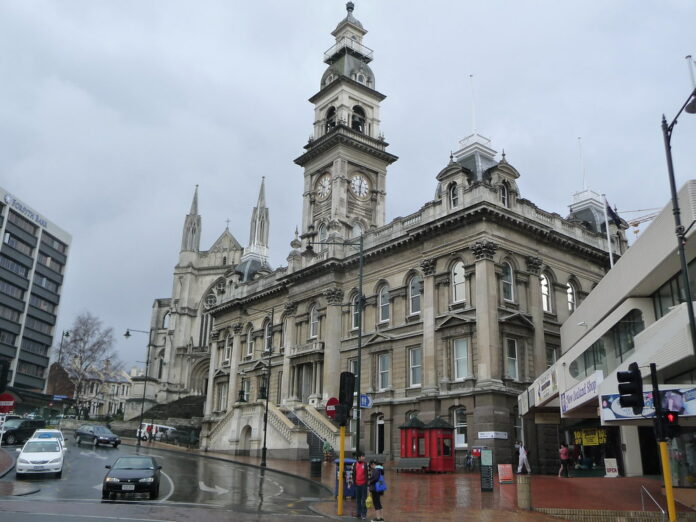An emotionally charged debate took place this week in the Dunedin City Council chambers. The original motion from councillor Marie Laufiso called for the council to fly the Palestinian flag from the mayoral balcony, as well as other Dunedin City Council buildings, on 29 November to mark Palestine Day. Following a lot of public feedback, the motion was amended to consider flying the NZ flag at half mast and this was passed 12-2.
The conflict in Gaza has brought disturbing images to our screens, from the brutal murder of peaceful concert goers on October 7, images of near naked lifeless women paraded on the streets of Gaza to cheering onlookers, to the terrified faces of men, women and children being taken captive, and finally the destruction of buildings in Gaza and victims emerging from the rubble. The battle on the ground is all too real.
But another battle is also raging and has done so for decades, that of the narrative, which is as contentious and conflicted as the military battle.
International Day of Solidarity with the Palestinian people on November 29 is a classic case in point, a rewriting of history to suit a political agenda. The date was designated by the UN General Assembly in 1977, in light of the adoption of the UN partition plan of 1947, which called for the establishment in the British Mandate for Palestine of a Jewish State, an Arab State and for Jerusalem to have corpus separatum status and to be administered by a special international regime.
The irony is that the Arabs resolutely opposed that plan. The majority of Jews in Mandate Palestine accepted the resolution but both the Arab Higher Committee and the Arab League rejected the resolution. Both those latter organisations (and a host of other Arab leaders) indicated a complete unwillingness to accept any form of territorial division. Despite adoption of the plan by the UNGA, it was never implemented. Instead, the Arabs announced their intention to take all necessary measures to prevent the implementation of the resolution, declaring war in Mandatory Palestine.
Historian Arieh Avneri writes,
As the partition vote approached, it became clear little hope existed for a political solution to a problem that transcended politics: the Arabs’ unwillingness to accept a Jewish state in Palestine and the refusal of the Zionists to settle for anything less. The implacability of the Arabs was evident when Jewish Agency representatives David Horowitz and Abba Eban made a last-ditch effort to reach a compromise in a meeting with Arab League Secretary Azzam Pasha on September 16, 1947. Pasha told them bluntly:
The Arab world is not in a compromising mood. It’s likely, Mr. Horowitz, that your plan is rational and logical, but the fate of nations is not decided by rational logic. Nations never concede; they fight. You won’t get anything by peaceful means or compromise. You can, perhaps, get something, but only by the force of your arms. We shall try to defeat you. I am not sure we’ll succeed, but we’ll try. We were able to drive out the Crusaders, but on the other hand we lost Spain and Persia. It may be that we shall lose Palestine. But it’s too late to talk of peaceful solutions.”
The War of Independence was fought from 29 November 1947 through 20 July 1949 (in four phases). After Britain unceremoniously left Palestine and relinquished its Mandate responsibilities in May 1948, Israel declared statehood. She was immediately attacked by five surrounding Armies. Though vastly outnumbered, Israel eventually won her defensive war.
Why, then, does the UN observe an International Day of Solidarity with the Palestinian People to remember a non-binding UN resolution that was vehemently opposed by the Arabs and never implemented or constituted into international law?
According to the UN Charter, UNGA Resolutions are not legally binding, being recommendations. Only resolutions adopted by the Security Council under Chapter 7 may be obligatory. For this reason, UNGAR 181 cannot, in any manner, be considered as a basis for a Palestinian claim to statehood. Especially since the Partition Plan refers to the creation of an Arab state, not a Palestinian state. In fact, nowhere is the creation of a Palestinian state for the Palestinian people indicated in the resolution, as there was never any such designation as “Palestinian” for the Arab population residing in the geographic region referred to at the time as Mandatory Palestine. While Arab nationalist movements were certainly present, it was not until the 1960s and 70s under Yasser Arafat and the PLO that Palestinian nationalism emerged.
Since the Arab states not only rejected the resolution upon its adoption, but also prevented its implementation, how can today’s Palestinian leadership (supported by the UN) either logically or legally claim Resolution 181 as a basis for the establishment of a Palestinian State?
However, logic, law, and indeed historical fact seem not to matter in the propaganda activism of the Palestinians and their supporters. November 29 is but one example of the historical revisionism that the Palestinian movement has successfully and persistently deployed. While older generations remember the history of Israel’s wars and its battle against enormous threats, the present generation is fed a diet of disinformation enticingly presented on social media platforms, where image is more important than fact and emotion overrides reason. Indeed, propagandists are making great strides in indoctrinating a whole generation unversed in history.



